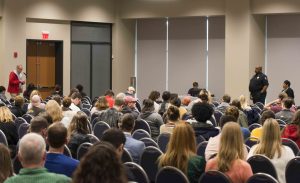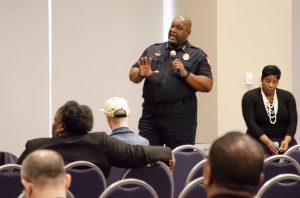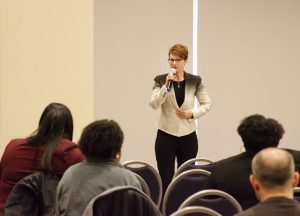Updated Feb. 22: This original article about the university’s policies on weapons referred incorrectly to the policy that existed before Feb. 15. Under that policy, weapons were in fact allowed on campus in public or nonsensitive areas with an Enhanced Carry Permit; it is not the case that “no weapons of any type were allowed on campus.” The new policy does not allow for anyone to bring a weapon to campus who would not have already had that right under the old policy.
Protesters and other campus visitors with enhanced concealed carry permits will be allowed to bring firearms onto the Ole Miss campus this weekend. The university announced this week that it recently completed the process of bringing its weapons policy into compliance with the state’s law on gun permits. At Wednesday’s forum regarding this weekend’s Confederate protest, university officials fielded questions from students about this update to school policy.

Photo by Christian Johnson
“Mississippi has very liberal gun legislation,” said Erica McKinley, the university’s chief legal officer and general counsel. “It is a rather unfortunate, and frankly damning, coincidence that when we realized and got aligned on that policy, we issued it when we did.”
McKinley said university policy was issued in order to comply with state laws and a recent amendment made to the state college board’s weapon policy.
“Under no circumstances did we modify our gun policy to allow any person to bring a gun under circumstances that the law would otherwise maintain is illegal,” McKinley said.
Confederate 901 — one of the groups protesting the removal of Confederate symbols on campus — insists they do not plan on inciting violence or bringing weapons of any kind this weekend.
“We’re not coming here to cause any trouble for the University of Mississippi,” a member of Confederate 901 said in a video posted to the group’s Facebook page. “We’re not coming here to cause a fight or to cause any kind of animosity or stop the traffic or block the traffic like (Black Lives Matter) does. We’re going to be obeying the law and walking on the sidewalks.”
There is an open carry law in the state, so both Confederate and anti-Confederate protesters will legally be allowed to carry weapons on the Square and in the city until they reach the university boundary, according to UPD Chief Ray Hawkins.
With a concealed carry permit, citizens are allowed to carry firearms in Oxford, but not on campus.

University Police Department Chief Ray Hawkins answers questions from members of the Ole Miss community about the upcoming protests and counterprostest this week. Photo by Parker Galloway
“On Saturday, what we’re going to do is we’ve set up two areas that will be secure because you will be checked going into those areas, whether it’s the protest area or the counterprotest area,” Hawkins said.
Students and employees of the university cannot have weapons on campus, and visitors on campus who have enhanced concealed carry permits may not enter any university building with a firearm in their possession.
“All of these groups have expressed a want for a peaceful protest, and we’re hoping that is what ensues,” Vice Chancellor for Student Affairs Brandi Hephner LaBanc said. “We encourage folks to just stay away and not engage in the area.”
Hephner LaBanc acknowledged critiques of the university’s response to the Confederate protesters. Many people were angered by the mild language in university statements and the university’s apparent refusal to “position itself in opposition to these outside groups.”
She said administration made its decisions in attempt to curtail the energy around the protests.
“It’s important that we indicate very clearly (that) we have not invited these groups to our campus,” she said. “These are outside groups, and they do not align with our institutional values. They are not who we are.”
Two of the most prominent administrative voices were missing from the Campus Conversation: Interim Chancellor Larry Sparks and Provost Noel Wilkin.

Vice Chancellor For Student Affairs Brandi Hephner Labanc speaks to Ole Miss students and faculty about the protest happening on Saturday. Photo by Parker Galloway
“A rather significant portion of our body is not here, and that’s our chancellor and our provost,” McKinley said. “Please do not assume by virtue of (the chancellor’s) absence that he isn’t tapped into this.”
McKinley said the preparation for these protests by administration, UPD and students will play an important role in ensuring safety for the community on Saturday.
“I’m no Donald Trump. I’m not going to sit here and suggest to you that there are good people on both sides. Absolutely not,” McKinley said. “The dangerous thing about Charlottesville and all those other places was the surprise.”
Hawkins, Hephner LaBanc and McKinley fortified the university stance that students and community members should avoid campus altogether on Saturday in order to lessen the probability of confrontation.
Several students in attendance expressed concern with the university’s efforts to address both the asserted reasons and the potential complications of the multiple protests expected on campus this week.
“This is the first instance that I’ve seen us be proactive, but I would like to see us be a little more proactive throughout the year so that, when things like this come up like this, we’re (prepared),” said Leah Davis, co-director of inclusion and cross cultural engagement for the Associated Student Body.






